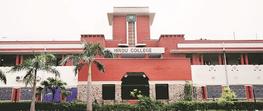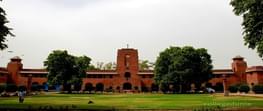The college offers a self-funded program under Delhi University with a focus on maintaining a balanced faculty-to-student ratio. Regular classes accommodate around 100 students, while special classes range from 20 to 120 students. Faculty experience and recruitment politics are noted concerns, with varying accessibility among teachers. Student assessment includes class tests, mid and end-semester exams, with attendance playing a key role in grading. The active placement cell, JEET, collaborates with top companies like Deloitte, Amazon, and NIIT to offer diverse placement and internship opportunities.
Students can secure placements from their third year, with average salary packages of 4.80 lakh, a median of 5.50 lakh, and a high of 18.75 lakh. JEET also conducts skill development workshops and provides internship offers to aid career advancement. While internships are often required in the sixth semester, the college supports students in obtaining them, though students are encouraged to be proactive. The course is among the most expensive at the university, with annual fees between 1 lakh and 1.15 lakh INR, reflecting the cost of high-end equipment like cameras and studio gear.
Fees have been increasing annually, and are substantially higher than similar courses in Mumbai, which cost about 60,000 INR. Although there are no campus placements for Mass Communication students, the college offers internships at the end of the second year. Scholarships and financial aid are available, with fees payable in two installments upon submitting proper documentation.

![Indraprastha College for Women - [IP]](https://image-static.collegedunia.com/public/college_data/images/logos/1393591589Indraprastha College for Women.png?h=71.7&w=71.7&mode=stretch)








.png?h=78&w=78&mode=stretch)
.png?h=78&w=78&mode=stretch)
.png?h=78&w=78&mode=stretch)






![Kirori Mal College - [KMC]](https://image-static.collegedunia.com/public/college_data/images/appImage/14918925121444136740KMCNEW.jpg?h=111.44&w=263&mode=stretch)

![Jesus and Mary College - [JMC]](https://image-static.collegedunia.com/public/college_data/images/appImage/14918878411444051059JMCNEW.jpg?h=111.44&w=263&mode=stretch)

![Hansraj College - [HRC]](https://image-static.collegedunia.com/public/college_data/images/appImage/1521444819cvrimge.png?h=111.44&w=263&mode=stretch)












![Aditi Mahavidyalaya - [AMV]](https://image-static.collegedunia.com/public/college_data/images/logos/1491907072logo.png?h=72&w=72&mode=stretch)
![Atma Ram Sanatan Dharma College - [ARSD]](https://image-static.collegedunia.com/public/college_data/images/logos/1491912596logo.png?h=72&w=72&mode=stretch)
![Bhagini Nivedita College - [BNC]](https://image-static.collegedunia.com/public/college_data/images/logos/1395655310Bhagini Nivedita College.png?h=72&w=72&mode=stretch)
![Bharati College - [BC]](https://image-static.collegedunia.com/public/college_data/images/logos/1395656554Bharati College.png?h=72&w=72&mode=stretch)
![Dr. Bhim Rao Ambedkar College - [BRAC]](https://image-static.collegedunia.com/public/college_data/images/logos/1492411231logo.png?h=72&w=72&mode=stretch)
![College of Vocational Studies - [CVS]](https://image-static.collegedunia.com/public/college_data/images/logos/1492415426logo.png?h=72&w=72&mode=stretch)
![Daulat Ram College - [DRC]](https://image-static.collegedunia.com/public/college_data/images/logos/1507912339daulatramcollegelogo.png?h=72&w=72&mode=stretch)

![Delhi College of Arts and Commerce - [DCAC]](https://image-static.collegedunia.com/public/college_data/images/logos/1491999035logo1.jpg?h=72&w=72&mode=stretch)
![Delhi School of Economics, University of Delhi - [DSE]](https://image-static.collegedunia.com/public/college_data/images/logos/1703734276mbadsebacombined1.png?h=72&w=72&mode=stretch)
.png?h=72&w=72&mode=stretch)
.png?h=72&w=72&mode=stretch)
.png?h=72&w=72&mode=stretch)


![Ambedkar University Delhi - [AUD]](https://image-static.collegedunia.com/public/college_data/images/logos/1420869990dr. ambedker.jpg?h=72&w=72&mode=stretch)
![Delhi University - [DU]](https://image-static.collegedunia.com/public/college_data/images/logos/1491817267UniversityofDelhi.png?h=72&w=72&mode=stretch)

![Sri Guru Tegh Bahadur Khalsa College - [SGTB]](https://image-static.collegedunia.com/public/college_data/images/logos/14920633101.jpg?h=72&w=72&mode=stretch)
![Jesus and Mary College - [JMC]](https://image-static.collegedunia.com/public/college_data/images/logos/1491887841col2177.jpg?h=72&w=72&mode=stretch)

![Kamala Nehru College - [KNC]](https://image-static.collegedunia.com/public/college_data/images/logos/1559378137logo2.jpg?h=72&w=72&mode=stretch)

![Dyal Singh College - [DSC]](https://image-static.collegedunia.com/public/college_data/images/logos/13957264961.png?h=72&w=72&mode=stretch)
![Lady Shri Ram College for Women - [LSR]](https://image-static.collegedunia.com/public/college_data/images/logos/1559556886lsrlogo9.jpg?h=72&w=72&mode=stretch)
![Gargi College - [GC]](https://image-static.collegedunia.com/public/college_data/images/logos/1506399496zsdmnnmnmsdfdf.png?h=72&w=72&mode=stretch)


Comments